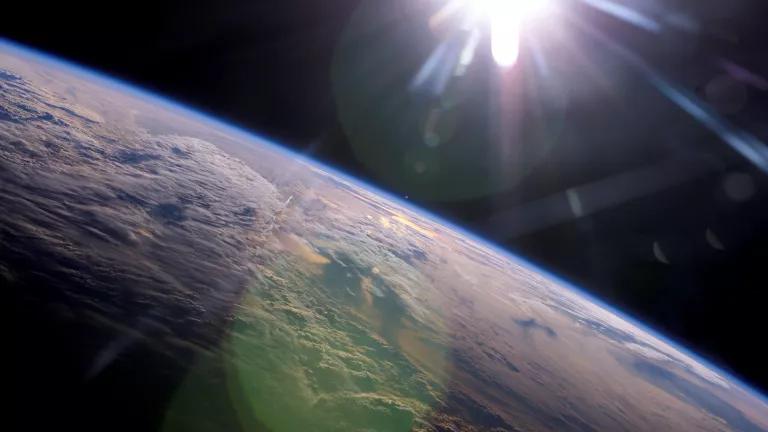Climate Scientists to World: We Have Only 20 Years Before There’s No Turning Back
So we’d better get it together and do something NOW.

NASA
UPDATE: On April 4, 2022, the IPCC released the Working Group III Sixth Assessment report on climate change mitigation. The report describes how, despite gains in the clean energy revolution, nations are falling far too short of reducing climate pollution quickly enough to avoid severe damage, cost, and upheaval. “The good news is that we have the climate solutions needed, and they work,” says NRDC president Manish Bapna. “For our economic and national security, and for the future of all life on earth, lawmakers must act without delay.”
It’s normal to feel temporarily paralyzed in the face of terrifying news. Obstacles never seem more insurmountable—and foes never seem more invincible—than they do at the moment you finally realize what you’re up against: the scale of the battle that awaits you, the consequences of losing it, the amount of time you’ve been given to organize and rally. No matter how much time you have, it never feels like enough.
Earlier this week, the Intergovernmental Panel on Climate Change (IPCC) issued a chilling report that has sent most people (with the notable exception of the current president of the United States) into a deep funk. In it, some 90 climate scientists from 40 countries conclude that if humans don’t take immediate, collective action to limit global warming to 1.5 degrees Celsius by 2040, the consequences will effectively be baked into the natural systems of the planet. With so much heat-trapping carbon in the atmosphere, there will be, in effect, no turning back. The extreme droughts, devastating wildfires, massive floods, deadly hurricanes, and widespread famines that we’re seeing more and more of these days will cease to be statistical anomalies and instead be more like seasonal markers, as regular as the changing of the leaves.
If such imagery shocks, the time line stuns. To avoid global catastrophe, according to the report, we’ll need to reduce global carbon emissions by as much as 40 percent by 2030. Despite all the evidence at our feet showing that climate change is an indelible part of our present-day lives, there are still some people who think of it as something far-off—a problem primarily for future generations to solve. But children who entered kindergarten last month will be high school sophomores in 2030. The “far-off” generation is no farther off than the next one.
In the three decades since it was founded, the IPCC has released many reports, each one coming with its own unique warnings. This one feels different, though. The authors aren’t just telling us what could happen if we don’t mend our ways and limit warming to less than 1.5 °C—the droughts, the wildfires, the melting permafrost, the coastal flooding, and so on. They state unequivocally that governments must make “rapid, far-reaching and unprecedented changes in all aspects of society” if we’re to beat the clock and save the planet.
Many of us are now trying to wrap our heads around what these changes might look like and how we might achieve them given our current political and economic realities. The details might vary around the edges, but fundamental to any escape plan will be energy policies that phase out coal entirely and replace it with renewables. Also essential will be global efforts to electrify our vehicle fleets, exponentially ramp up energy efficiency in our buildings, and—crucially—preserve our carbon-trapping forests. The cost of all this, the IPCC soberly estimates, will be nothing less than 2.5 percent of global GDP. To help pay this tremendously large bill, the authors propose a worldwide carbon tax of as much as $27,000 per ton.
With everything else the world’s governments are currently dealing with, could we ever really come together so quickly and collectively embark on this singular act of civilizational self-defense? There’s just not enough time, some say. We don’t have the technology yet. The deck is stacked against us. We can’t possibly hope to win.
But history says otherwise. After that feeling of temporary paralysis subsides, human beings are actually quite good at rising to the occasion—tapping into hidden reservoirs of energy, ingenuity, and resolve and doing whatever it takes to solve a problem or even to bend the arc of history. In the early 1950s, polio, which had been literally plaguing America for decades, was still paralyzing and killing tens of thousands of Americans, including thousands of children, each year. Jonas Salk’s vaccine was the culmination of a worldwide race among scientists to find a way of ending the annually recurring epidemics. A polio vaccine was first made available to the public in 1955, and by the early 1960s the epidemics were 97 percent contained.

New York’s Times Square is packed with crowds celebrating as World War II neared its end in 1945.
Tom Fitzsimmons/AP
It’s precisely when the stakes are high that humans show they’re capable of uniting toward a shared goal. World War II ended in Europe exactly 5 years, 8 months, and 7 days after Germany invaded Poland in 1939. Nations—even those that normally thought of themselves as antagonists—set aside their differences and united to defeat a seemingly unstoppable force. In other words, when confronted with the image of a bleak future, greater humanity fought back. And ultimately, greater humanity won.
It took us 5 years, 8 months, and 7 days to save the world last time. We don’t have much more time than that now. But we do still have some time to act. And unlike WWII, it’s a fight we know up front we can win. We have not only the technology and the solutions to do it, but also the twin benefits of scientific foresight and historical hindsight at our disposal. The former tells us what awaits us if we don’t come together. The latter tells us what we can accomplish if we do.
This article was originally published on onEarth, which is no longer in publication. onEarth was founded in 1979 as the Amicus Journal, an independent magazine of thought and opinion on the environment. All opinions expressed are those of the authors and do not necessarily reflect the policies or positions of NRDC. This article is available for online republication by news media outlets or nonprofits under these conditions: The writer(s) must be credited with a byline; you must note prominently that the article was originally published by NRDC.org and link to the original; the article cannot be edited (beyond simple things such grammar); you can’t resell the article in any form or grant republishing rights to other outlets; you can’t republish our material wholesale or automatically—you need to select articles individually; you can’t republish the photos or graphics on our site without specific permission; you should drop us a note to let us know when you’ve used one of our articles.

A Consumer Guide to the Inflation Reduction Act
Should I Become a Poll Worker?
1.5 Degrees of Global Warming—Are We There Yet?